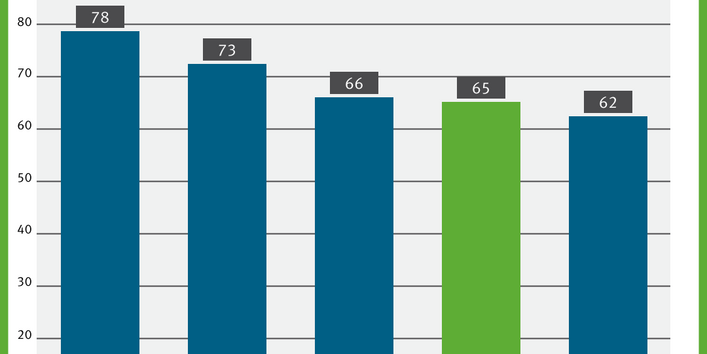Germans consider environmental protection and climate action highly relevant – despite coronavirus pandemic
Despite the coronavirus pandemic, 65 percent of Germans consider environmental protection and climate action to be a very important issue. Climate action in particular remains just as important during the pandemic for 70 percent and has actually become more important for 16 percent. The people surveyed see a need for action above all in energy, agriculture and transport. These are the results of a representative population survey on environmental awareness 2020 in Germany, presented today by German Environment Minister Svenja Schulze and Dirk Messner, President of the German Environment Agency (UBA).
The survey results indicate broad support among the population for socioecological transition. For instance, a clear majority of around 80 percent is in favour of Germany taking on a leadership role on the international stage when it comes to climate action. For about 60 percent of those surveyed, environmental protection and climate action should play a greater role in agricultural policy, and about one in two sees this as the case with transport policy. There is very strong support for ecological structural change in Germany: around 90 percent of respondents are in favour of a rapid and at the same time socially acceptable transformation to a sustainable economy.
Federal Environment Minister Svenja Schulze said, "The pandemic has defined our everyday life for more than a year. Nevertheless, environmental protection and climate action are and will remain a top issue for people in Germany. People want change and are demanding it in no uncertain terms. This is an encouraging sign for the coming years in which climate protection will become a guiding principle for almost all policy areas with the aim of making Germany climate-neutral. The majority of people have long seen that climate action creates jobs and makes our economy more competitive. The study is particularly interesting when it comes to concrete issues such as the speed limit. Compared to the last survey, there has been a noticeable increase towards a broader and clear majority in favour of a 130 km/h speed limit on motorways. This would be not only good for the climate, but would also ensure more safety on the motorways.
The respondents see a great need for action in agriculture and nutrition. Among the areas where action is needed, reducing packaging waste and food waste are at the top of the list at around 90 per cent. More attention should also be paid to animal welfare. For the majority, more environmental protection in food supply and production also includes a better range of vegetarian and vegan products and dishes in canteens and restaurants. Almost two thirds of the respondents expressed the same wish.
The respondents also see a need for policy makers to do some homework on mobility. About 90 percent of those surveyed want bus and train travel to become cheaper and the range of services to be expanded. The majority of respondents also agree with more cycle paths and cycle lanes; the same goes for a speed limit on motorways, which about 65 percent want.
President Dirk Messner of the German Environment Agency said, “The people in Germany are very aware that ambitious environmental protection and climate action ultimately sustains their own livelihoods. This decade is decisive for whether we succeed in setting the right course for a sustainable future or not. We must not let this unique window of opportunity pass us by - especially since a socioecological transition not only creates a better quality of life, but also stimulates the economy.”
A representative study was conducted in November and December 2020 in which 2,115 citizens aged 14 and over were interviewed. The survey and analysis were carried out by the infas Institute for Applied Social Sciences and the Institute for Social-Ecological Research (ISOE). A background paper with the most important long-term developments will also be published on the occasion of the 25th anniversary of the study and the environmental awareness research in the area of environment.

